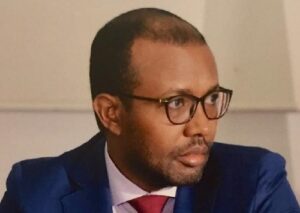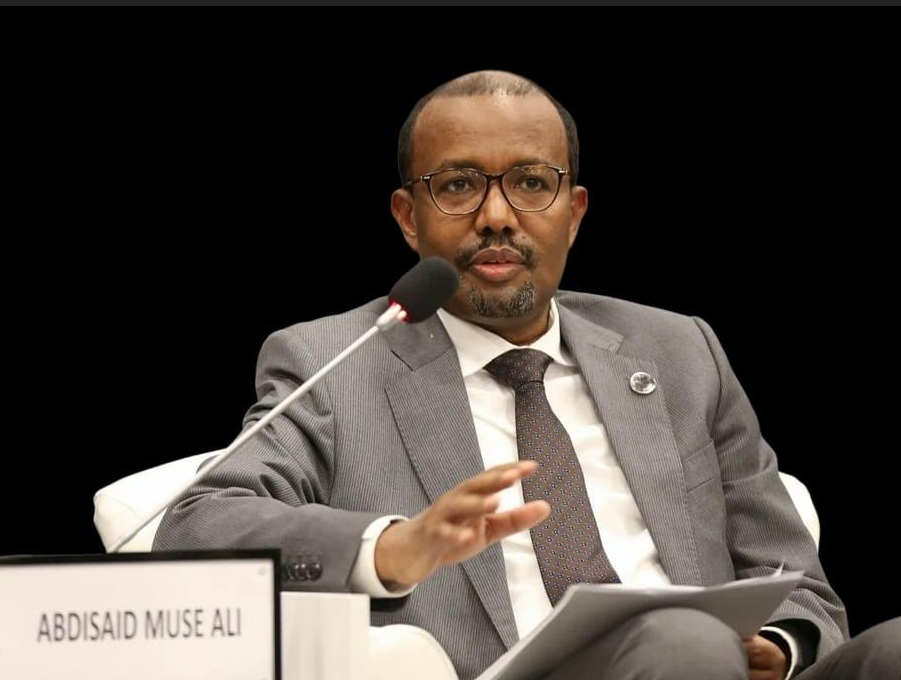World Geostrategic Insights interview with Abdisaid Muse Ali on the significance of Somalia’s accession to the East African Community (EAC), the country’s progress, the value of its partnership with the European Union, the security challenges posed by Salafi-jihadism, and the current state of Somali-Russian relations.

Abdisaid Muse Ali is Chairperson of the Lome Peace and Security Forum and former Minister of Foreign Affairs and International Cooperation of Somalia. He has over 15 years of experience working with international companies and governments in the Horn of Africa, including regional security sector strategy projects, proposal development, team management and leadership, and advisory responsibilities, at national, regional and global levels.
Q1 – Last December the Federal Republic of Somalia was formally admitted as the 8th member state of the East African Community (EAC). Given the EAC’s customs union, Somalia’s membership in the bloc should be economically beneficial to the country and its immediate neighbors. Somali entrepreneurs would have more investment opportunities, and some of the social and economic pressures resulting from the country’s isolation would be alleviated. However, there are also discordant voices. According to some analysts, Somalia’s membership in the EAC raises critical issues: Somalia has very limited capacities compared to other East African Community partners and would therefore be at a great disadvantage, plunged into new problems. What is your opinion?
A1 – While the entry of Somalia might provide security issues to the bloc, it is also worth looking at the positives that the country brings to the regional economic bloc as well as the benefits working with EAC portends. First, Somalia has Africa’s longest coastline and an estimated two million citizens in the diaspora. As such, it is well-positioned for economic integration with its neighbors owing to enormous blue economic potential. Secondly, tapping into the entrepreneurial culture of Somalis will go a long way in enhancing trade and economic activities across the bloc.
Regarding Somalia’s capacity, East Africa has a potential to contribute to Somalia’s rehabilitation while also capitalizing on Somalia’s relations with its diaspora, Middle Eastern connections, and strategic location. Furthermore, the EAC can rally support, resources, and collaboration to defeat Salafi-Jihadism in Somalia and have its members participate in the rebuilding and reconstruction of Somalia. Somalia could also provide an excellent opportunity for regional investment.
In addition, the EAC can assist with institution development. This is because, after admission, Somalia must build infrastructure to reap the benefits of regional integration. As a result, if the Somali government takes the development of institutions seriously, Somalia will have a chance to establish a fully functional governance system. On the political level, the bloc’s participation through chosen dignitaries may allow Somalia’s Federal Government to participate in conversation, popularize its offers of amnesty for al-Shabaab fighters, and facilitate grassroots discussion in conflict-affected communities.
Q2 – Josep Borrell, the EU High Representative for Foreign Affairs, recently stated that Somalia’s security policy, its overall stability, sovereignty and territorial integrity are fundamental to the country, the region and the EU, and that despite all the challenges threatening the stability of the Horn of Africa we are also witnessing positive developments, since the election of President Hassan Sheikh Mohamud in May last year, significant efforts have been made to stabilize and pacify Somalia, and in particular, “Somalia demonstrates that positive changes are possible in the Horn of Africa region through sustained investment and engagement.” Last May, the EU and Somalia adopted a joint roadmap based on joint work to define priorities and milestones, and on Oct. 26,23 the EU announced an 89.5 million euro multi-year action plan, including 20 million euro for crucial budget support, to support the ongoing Somali state-building process. What is your opinion? Has there been substantial progress in Somalia in recent months? How do you rate the EU Somalia partnership?
A2 – Somalia has made significant progress across multiple sectors over recent months. Three critical areas stand out; enhancing the Somalia national security architecture, Institutional capacity building and degrading al-Shabaab and other Salafi-Jihadist militants. The country has been enhancing its security and institutional preparedness in assuming responsibility for its own security. However, the drawdown of international presence from ATMIS, the proliferation of small arms and light weapons and geopolitical maneuvering in the Middle East and the Horn of Africa poses significant security challenges in Somalia.
Regarding EU-Somalia partnership, The EU-Somalia partnership is a complex and multifaceted collaboration that involves diplomatic, economic, and humanitarian efforts.
EU funding has been crucial for various projects, including security sector reform, institutional capacity-building and the provision of humanitarian aid. Additionally, the EU-Somalia partnership plays a vital role in supporting Somalia’s stability, governance, and development. However, this partnership tends to lack the holistic approach necessary to address the long-term socio economic and development issues bedeviling Somalia. Moreover, this partnership tends to ignore home grown solutions to Somali problems.
Q3 – Al-Shabaab is still fighting one of the world’s largest and deadliest insurgencies. In May 2022, Biden decided to send about 500 U.S. troops to Somalia, and U.S. military forces have increased military strikes in Somalia against al-Shabaab insurgents, conducting dozens of airstrikes in 2023. In addition, the United States has sent advisors to train Somali security forces and maintains an active presence in neighboring Djibouti at Camp Lemonnier base. What is your opinion on the effectiveness of U.S. forces’ support in the fight against Al-Shabaab? The Somali government embarked in the last months on what has been described as the most significant offensive against the al-Shabab extremist group in more than a decade. As the Somali army and allied clan militias continue to drive al-Shabab fighters out of some locations in central Somalia, how do you see the prospects for dealing with security threats from insurgent and al-Qaida’s East Africa affiliate groups?
A3 – Salafi-jihadism can be defeated. However, more must be done beyond the militaristic approach to the securitization of Somalia. Improving state-society is critical for reducing the legitimacy of these malign actors. It is also critical to avoid militarizing the state and instead address the fragility of the state and its institutions by strengthening and addressing their weaknesses, encouraging a robust civil society, and promoting sustainable development in order to combat poverty, marginalization, and societal inequalities as building blocks for long-term peace. This will contribute not only to the restoration of government legitimacy, but also to the establishment of inclusive governance solutions. Additionally, Harnessing the energy that comes with youth, as well as their creativity and power, is crucial in strengthening the resilience of these societies, not just in battling violent extremism, but also in constructing more peaceful, just, and inclusive societies.
Third, there is an urgent need to abandon the militarized fight on terror. A militaristic security posture promotes authoritarianism and the repression of rights. This tends to elicit militaristic citizen pushback. Furthermore, Mogadishu should invest in and foster “bottom-up” local solutions to the region’s concerns of violent extremism and violent extremism. Fourthly, there is an urgent need to address the underlying roots of violent extremism, and the region’s militarization is also critical to eradicating violent extremism. Violent extremism and violent extremism do not arise out of thin air. Grievances tend to arise when the state and its institutions frequently violate human rights and the ethos of good governance is pushed to the margins. Human rights violations, authoritarian governments, poverty, and marginalization must all be addressed. The emphasis should be on using peace-building approaches to prevent, manage, and resolve societal issues. It is also necessary to secure lawful trade and communication routes and preserve existing economic interests and lay the groundwork for trade and investment.
Q4 – Russia has expressed willingness to provide the Somali army with military equipment for its war against terrorism. In addition, Russia granted Somalia debt relief of more than $684 million in an agreement finalized on the sidelines of a Russia-Africa summit in St. Petersburg in July 2023. How would you describe the current state of Russia-Somalia relations?
A4 – In modern times, Russia and Somalia have had fairly ordinary diplomatic relations, with Russia providing humanitarian aid to Somalia on various occasions especially at the UNSC level, Russia is one of the key countries that affirm Somalia’s territorial integrity, political independence and unity of Somalia. Many of our allies and partners have embassies in Somalia but Russia still doesn’t have a permanent mission in Mogadishu.
Abdisaid Muse Ali – Chairperson of the Lome Peace and Security Forum and former Minister of Foreign Affairs and International Cooperation of Somalia.







